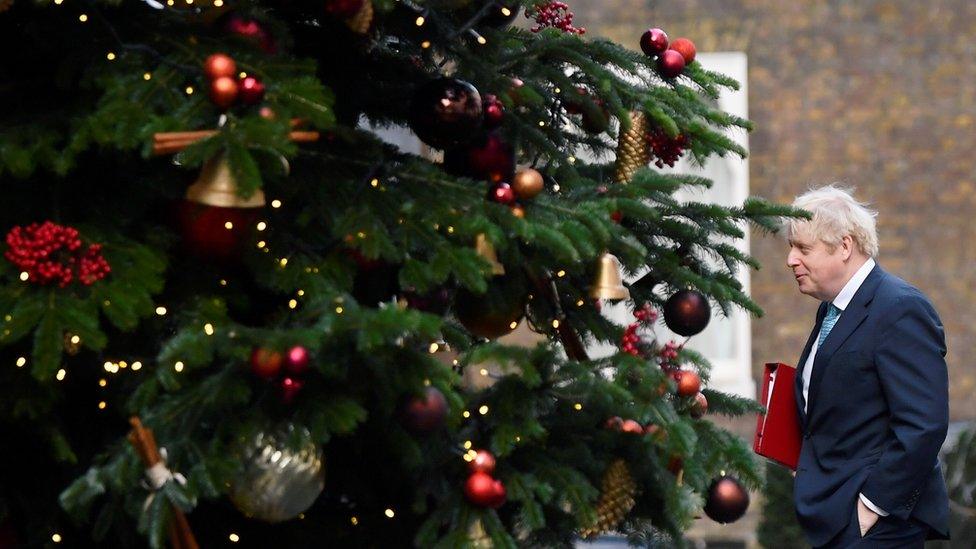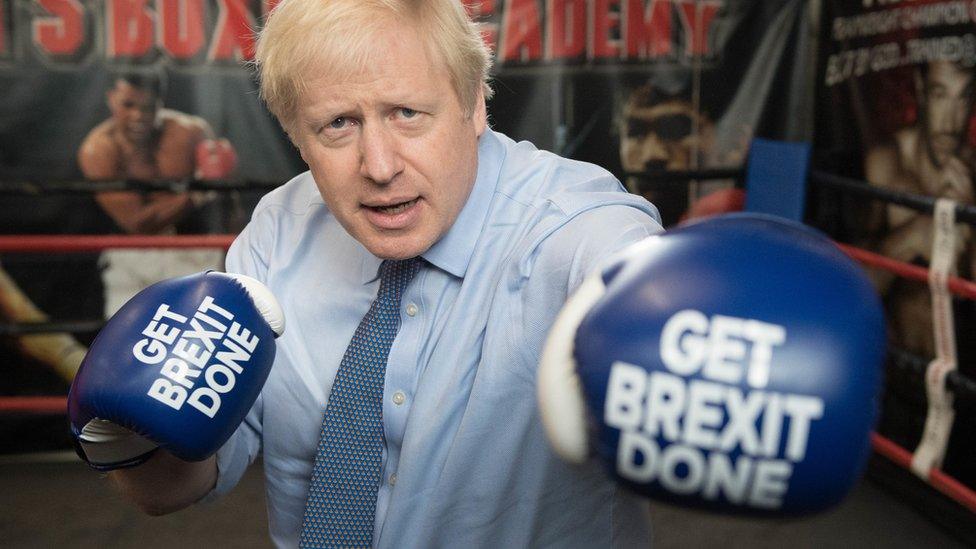Brexit: UK wants EU trade deal but not 'at any cost' - Boris Johnson
- Published
- comments

Boris Johnson walks past the Downing Street Christmas tree as he returns to No 10 after a cabinet meeting at the Foreign and Commonwealth Office
The UK wants a post-Brexit trade deal with the EU but not "at any cost", Boris Johnson has told his cabinet.
Mr Johnson also told his senior ministers that the talks are still "most likely" to end without an agreement, the PM's spokesman said.
UK-EU officials are trying to agree a trade deal by 31 December, when the UK stops following EU trading rules.
If no deal is reached, the UK and EU would trade under World Trade Organization rules.
This outcome would lead to each side imposing taxes - or tariffs - on imported goods, potentially leading to higher prices.

The basics
Brexit happened but rules didn't change at once: The UK left the European Union on 31 January 2020, but leaders needed time to negotiate a deal for life afterwards - they got 11 months.
Talks are happening: The UK and the EU have until 31 December 2020 to agree a trade deal as well as other things, such as fishing rights.
If there is no deal: Border checks and taxes will be introduced for goods travelling between the UK and the EU. But deal or no deal, we will still see changes.

Throughout the negotiations the key obstacles to an agreement have been access to UK fishing waters, how far the UK should be able to depart from EU standards, and how any agreement should be policed.
Talks between the UK and EU resumed after both sides agreed on Sunday there had been sufficient progress for discussions to continue.
The current set of talks are expected to concentrate on the extent to which the UK should be free to diverge from EU rules and regulations - such as employment rights or business subsidies.
The EU is believed to be prepared to accept UK divergence, if safeguards are in place to prevent what the bloc sees as unfair competition.
The UK side has repeatedly insisted it wants the power to set its own rules.
Speaking on Monday, European Commission President Ursula von der Leyen said the UK has "either to play by our rules, because this is a matter of fairness for our companies... or the other choice is there is a price on it, and the price is border and tariffs."
In Tuesday's cabinet meeting, Mr Johnson said that ending talks on WTO terms, what he described as an Australia-style arrangement, "remained the most likely outcome" but that he was "committed to continuing to negotiate" on remaining areas of disagreement.
However Irish Taoiseach - or prime minister - Micheál Martin said the fact that talks are continuing is a "good sign" and that he had "greater hope" than last week that a deal could be reached.
On a visit to India, Foreign Secretary Dominic Raab said the UK has been "sometimes been too myopically-focused just on Europe" but added that the country was about to "regain control" to make new deals "where growth opportunities in the future will be".
Meanwhile, after a lengthy tussle between the House of Lords and the government, a compromise has been reached on the Internal Market Bill.
This is one of the government's key pieces of Brexit legislation which aims to ensure goods can be traded within the UK in spite of differing standards between nations.
Time to smell the post-Brexit coffee? How the UK's internal market may work from 2021
The Lords had been insisting on more flexibility for the devolved governments to vary standards for goods, or requirements for professional qualifications.
Following defeats in the House of Lords on the issue, ministers agreed to allow for some variation and the bill was approved without a vote.
The legislation will now head back to the House of Commons where it is likely to receive the backing of MPs.
The government suffered another defeat in the Lords when peers voted to amend the Trade Bill to ensure Parliament would gets more scrutiny of post-Brexit trade deals.



Related topics
- Published29 December 2020

- Published14 December 2020
- Published13 December 2020